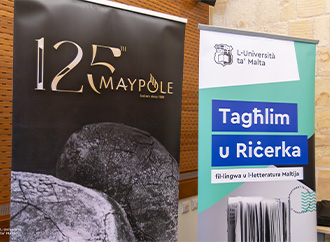
Why Learning Maltese Matters in a Global Workplace
Across Malta’s growing retail and hospitality sectors, language is more than a communication tool – it is a bridge to customer trust, employee engagement, and community integration. The University of Malta’s new collaboration with Maypole, a nationwide convenience‑store chain, demonstrates how targeted language training can create tangible business value while supporting cultural inclusivity.
Business Benefits of a Dual‑Language Workforce
- Improved customer satisfaction as shoppers receive assistance in their preferred language.
- Reduced miscommunication risks in product recommendations and safety alerts.
- Enhanced team dynamics, with employees feeling respected and understood.
- Positive brand perception that attracts a broader customer base.
For managers and HR professionals, equipping staff with basic Maltese provides clear competitive advantage in an increasingly interconnected market.
Design of the Collaborative Maltese Course
The university’s Department of Maltese has partnered with Maypole to launch a 17‑session course focused specifically on shop‑related interactions. The curriculum balances speaking, listening, and essential grammar, ensuring that participants can immediately apply what they learn on the job.
Course Structure and Delivery Format
- Practical Sessions: 17 targeted modules featuring realistic dialogues, role‑plays, and on‑site practice within Maypole stores.
- Blended Learning: Online micro‑modules complement in‑person practice to reinforce vocabulary and pronunciation.
- Assessment: Continuous form‑based assessments track progress and identify areas for individualized support.
Because the training is profit‑aligned, staff will receive support without compromising shift schedules. Course timing and placement can be customized to each store’s customer traffic and staffing patterns.
Impact on Employees and the Community
Staff who participate in this initiative experience greater job satisfaction, a stronger sense of belonging, and renewed confidence in daily interactions. Moreover, customers benefit from clearer instructions, better service, and a welcoming environment where language is not a barrier.
Stories from the Frontline
Ms. Lukija, a cashier who joined the program last semester, describes how “speaking Maltese has opened new friendships with regulars and fostered a sense of pride that I never knew I had.” Her story reflects an outcome university leaders and Maypole executives hoped to achieve: lasting community ties built through shared language.
Leveraging University Resources for Continuous Learning
The University of Malta has a long history of offering Maltese as a foreign language. Today, over 800 students take courses ranging from general exposure to specialized applications such as healthcare or corporate communications. These programs demonstrate the university’s ability to adapt curriculum to diverse learner profiles.
Opportunities for Employers
- Custom language tracks for specific business functions.
- Expedited course completion for staff managing high‑volume customer interactions.
- Partnership agreements that allow staff to receive university‑accredited certificates at discounted rates.
- Workshops on multilingual communication strategies for senior managers.
By integrating language training into employee development plans, companies not only enhance service levels but also signal commitment to workforce diversity and inclusion.
How to Enroll and What to Expect
- Check Eligibility: The course is open to all non‑Maltese speaking employees working at any Maypole outlet.
- Register Online: Completed forms can be submitted through the University of Malta enrollment portal. Include your Employee ID and desired start date.
- Attend Orientation: Introduction to course objectives and assessment methodologies.
- Begin Practicing: Follow the blended learning plan, attend weekly sessions, and submit required listening and speaking exercises.
- Earn Certification: Upon successful completion, participants receive a certificate from the Department of Maltese recognized by both the university and local businesses.
Course registration opens every quarter, with multiple start dates available to align with store operations.
Benefits for the Wider Maltese Community
Because language proficiency enhances community cohesion, populations that previously felt marginalized can now fully engage in civic and economic life. Government initiatives that support multilingual education complement this business‑driven approach, fostering a more inclusive public sphere.
Supportive Policies and Incentives
- Tax Credits: Employers who provide language training may qualify for tax relief under the Malta Employment Promotion Act.
- Government Grants: The Ministry of Education offers subsidies to organizations that deliver accredited language courses to non‑native speakers.
- Public Recognition: Awards such as the ‘Community Impact Award’ highlight organisations making a measurable difference in integrating migrants.
By aligning with these incentives, companies can improve both social outcomes and corporate social responsibility metrics.
Key Takeaways for Leaders and HR Professionals
- Language training increases customer loyalty and reduces operational inefficiencies.
- Aprised collaboration between academia and industry yields courses that match real‑world needs.
- Employee development in linguistic skills strengthens team morale and social inclusion.
- Leveraging local university resources can reduce training costs and accelerate impact.
Implementing a structured language learning program is a straightforward investment that delivers measurable returns across employee engagement, customer satisfaction, and community integration.
Action Steps If You’re an Employee
Are you ready to enhance your career prospects and broaden your cultural horizons? The University of Malta’s Maltese course is tailored to fit busy schedules and includes practical, job‑directed content. Enroll today.
CTA: Submit your application now and start speaking Maltese in the work environment that matters most.
Action Steps If You’re a Manager or Employer
Consider evaluating your workforce’s language skills and exploring partnership opportunities with local universities. A bilingual team not only improves customer experience but also signals a forward‑thinking, inclusive culture.
CTA: Schedule a free consultation with the University of Malta’s language outreach team to learn how you can integrate this course into your training budget.
Get Involved and Stay Updated
The University of Malta regularly publishes updates on new language programs, scholarship opportunities, and success stories from partner companies. Follow us via email, social media, or our campus newsletters to keep your team informed and motivated.
CTA: Share your own language learning experiences in the comments below or contact us to discuss how this initiative can be expanded to your organization.

